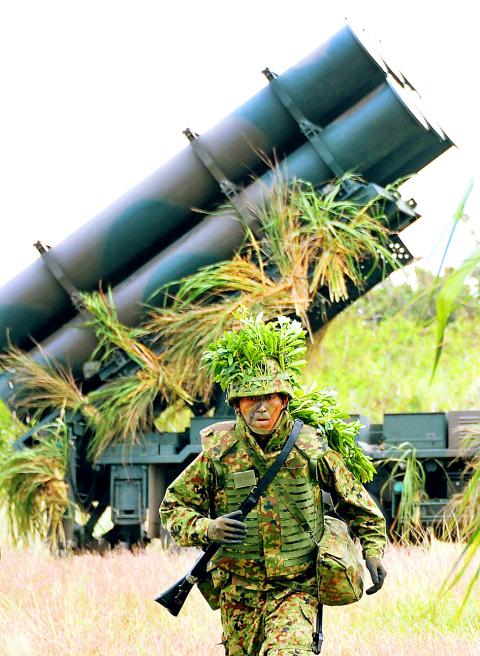Japan yesterday warned that China’s “dangerous acts” over territorial claims in the East China Sea could lead to “unintended consequences” in the region, as fears grow of a potential military clash.
The annual defense white paper was adopted by Japanese Prime Minister Shinzo Abe and his ministers at a Cabinet meeting, heaping criticism on Beijing’s unilateral declaration of an air defense identification zone (ADIZ) late last year.
The zone sparked regional criticism, as well as condemnation from Washington, while commentators voiced concern over the growing chances of an armed conflict between the two Asian powers.

Photo: AFP
Tokyo’s paper, which noted that China’s military budget had quadrupled over the past decade, said Japan was seeing an “increasingly severe” security environment.
“Japan is deeply concerned about the establishment of ‘the East China Sea ADIZ’ which is a profoundly dangerous act that... escalates the situation and may cause unintended consequences,” the 505-page paper said.
Chinese vessels and aircraft have regularly approached an East China Sea archipelago which is believed to harbor vast natural resources below its seabed and is claimed by both countries after Tokyo nationalized three of the islets in 2012.
The islets are called the Senkaku Islands by Japan, the Diaoyu Archipelago (釣魚群島) by China and the Diaoyutai Islands (釣魚台) by Taiwan, which also claims them.
In a June confrontation, Tokyo said that two Chinese fighter jets flew within 30m of its aircraft in an area where the two nations’ air defense zones overlap.
Beijing responded that it was Japanese military planes that flew dangerously close to its aircraft. China has also laid claim to much of the South China Sea, angering Vietnam, the Philippines and other Southeast Asian nations.
“In regard to conflicts over maritime interests, China has adopted assertive measures, including attempting to alter the status quo by coercive measures... which is incompatible with the existing international law and order,” the paper said. “These measures include dangerous acts that could cause unintended consequences and raise concerns over China’s future direction.”
Tokyo’s paper also warned that an unpredictable North Korea “repeatedly uses militarily provocative words and actions.”
“Military trends in North Korea constitute a serious destabilizing factor to the security not only of Japan, but of the entire region and the international community,” it said.
Japan’s military budget had been on the decline since 2002, but it has taken an upward turn, rising 2.2 percent in the current fiscal year, the paper said.

The US government has signed defense cooperation agreements with Japan and the Philippines to boost the deterrence capabilities of countries in the first island chain, a report by the National Security Bureau (NSB) showed. The main countries on the first island chain include the two nations and Taiwan. The bureau is to present the report at a meeting of the legislature’s Foreign Affairs and National Defense Committee tomorrow. The US military has deployed Typhon missile systems to Japan’s Yamaguchi Prefecture and Zambales province in the Philippines during their joint military exercises. It has also installed NMESIS anti-ship systems in Japan’s Okinawa

‘WIN-WIN’: The Philippines, and central and eastern European countries are important potential drone cooperation partners, Minister of Foreign Affairs Lin Chia-lung said Minister of Foreign Affairs Lin Chia-lung (林佳龍) in an interview published yesterday confirmed that there are joint ventures between Taiwan and Poland in the drone industry. Lin made the remark in an exclusive interview with the Chinese-language Liberty Times (the Taipei Times’ sister paper). The government-backed Taiwan Excellence Drone International Business Opportunities Alliance and the Polish Chamber of Unmanned Systems on Wednesday last week signed a memorandum of understanding in Poland to develop a “non-China” supply chain for drones and work together on key technologies. Asked if Taiwan prioritized Poland among central and eastern European countries in drone collaboration, Lin

BACK TO WORK? Prosecutors said they are considering filing an appeal, while the Hsinchu City Government said it has applied for Ann Kao’s reinstatement as mayor The High Court yesterday found suspended Hsinchu mayor Ann Kao (高虹安) not guilty of embezzling assistant fees, reducing her sentence to six months in prison commutable to a fine from seven years and four months. The verdict acquitted Kao of the corruption charge, but found her guilty of causing a public official to commit document forgery. The High Prosecutors’ Office said it is reviewing the ruling and considering whether to file an appeal. The Taipei District Court in July last year sentenced Kao to seven years and four months in prison, along with a four-year deprivation of civil rights, for contravening the Anti-Corruption

NO CONFIDENCE MOTION? The premier said that being toppled by the legislature for defending the Constitution would be a democratic badge of honor for him Premier Cho Jung-tai (卓榮泰) yesterday announced that the Cabinet would not countersign the amendments to the local revenue-sharing law passed by the Legislative Yuan last month. Cho said the decision not to countersign the amendments to the Act Governing the Allocation of Government Revenues and Expenditures (財政收支劃分法) was made in accordance with the Constitution. “The decision aims to safeguard our Constitution,” he said. The Constitution stipulates the president shall, in accordance with law, promulgate laws and issue mandates with the countersignature of the head of the Executive Yuan, or with the countersignatures of both the head of the Executive Yuan and ministers or